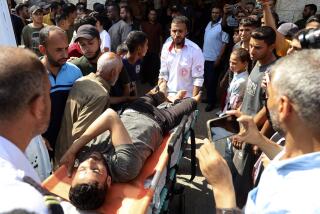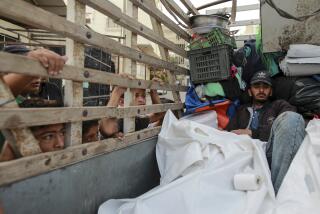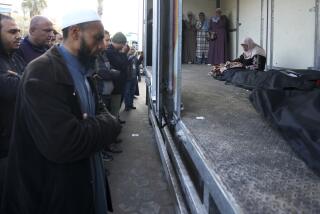Iraq Claims Battlefield Victories as Hussein Exhorts Troops to Fight On : Propaganda war: Baghdad says the U.S.-led offensive ‘has totally failed’ and that the allies are ‘wading in their own blood.’
AMMAN, Jordan — Ignoring the allies’ reports of battlefield success, Iraq insisted Sunday that the U.S.-led ground offensive “so far has totally failed,” asserting that the allied forces were “wading in their own blood” at Iraq’s defensive positions in and around Kuwait.
The Iraqi military’s daily communique, issued about 10 hours after President Bush announced that the land war had begun, noted that the allies were continuing to attack “on all fronts,” but it declared that Iraq’s forces already had won, adding, “Victory is sweet.”
So began the propaganda war that most analysts expect to continue throughout the land battle, a conflict that is virtually off limits to Western journalists.
Most analysts characterized Sunday’s communique as predictable, coming as it did just hours after Iraqi President Saddam Hussein delivered one of the most emotional speeches of his 12 years in power.
Exhorting his hundreds of thousands of ground troops to fight to the death for more than a dozen causes--among them faith, manhood, family, national pride and women and children--Hussein warned them that if they fail, “there will only be the deep abyss to which the enemies are aspiring to push you, and a lengthy darkness will prevail over Iraq.”
The Iraqi leader, whose prerecorded message was broadcast several hours after the allied assault began, again leveled personal attacks on President Bush, labeling him “treacherous,” and Saudi Arabia’s King Fahd, whom he called Bush’s “filthy agent.”
But he professed confidence that his troops will “show no mercy” and ultimately prevail because they “are in the camp of faith, unshifting principles, loyalty and sincerity.”
On the ground, however, Iraq’s military authorities clearly were concerned. Army checkpoints went up throughout Baghdad, the capital, for the first time since Iraq’s invasion of Kuwait six months ago, and witnesses said soldiers were attempting to draft any who passed through the checkpoints into Iraq’s national militia.
Western journalists in the city, who are largely confined to their hotel and subject to strict government censorship, described the Iraqi mood as one of “confused caution.”
In a dispatch sent about 12 hours after the allies launched the ground war, Tim Llewelyn, a British Broadcasting Corp. correspondent in Baghdad, reported, “The feeling is, there’s nothing left to do now but fight and hope they can hang on.”
Llewelyn, who noted that the Iraqi regime was the first to comment in any detail on the ground fighting, said the Iraqis apparently are closely monitoring state-run Baghdad Radio for war reports.
“At least the Iraqis are telling their people the news--accurate or not--unlike the allies,” he said.
A Western military analyst in the Middle East added: “I think there’s going to be an accuracy problem on both sides before it’s all said and done. Still, it will be interesting what the two sides do tell their people.”
In addition to Baghdad’s victory claims, Iraq’s 18 million people also heard through Sunday’s communique that their “courageous” front-line troops in and around Kuwait were deployed “in small units in defensive positions.” The broadcast added that, despite simultaneous attacks on six separate divisions at the front, “Our armed forces at all battlefronts were able to contain the ground offensive.”
Iraq also insisted that its troops were still in possession of Faylakah Island, a strategic spot controlling the naval approaches to Kuwait city.
Western military analysts who monitored the Baghdad Radio broadcast in the Middle East said the statements indicated that the Iraqis so far have put up little resistance to the advancing allied troops.
“The intrinsic advantages to a defender are his fortified positions and the fact that they are hidden,” one said. “He can see you before you see him.
“But once the Iraqis declare their position by returning fire, they lose that advantage. So there’s no question most of their dug-in defensive troops are just holding their fire until the allies get close enough for major kills.”
It was just such devastating losses that the Iraqi communique predicted for the allies in the coming days of battle. Declaring the overall military situation “the best that could be imagined at this stage,” the broadcast added, “every enemy soldier is wading in their own blood.”
There was a distinctly political statement in the military report as well. Noting that Egyptian troops are taking part in the massive offensive, the broadcast called such involvement “a shameful and regrettable act--Arabs fighting alongside foreigners against Arabs.”
Later, Baghdad Radio issued what many analysts saw as yet another--and now almost desperate--appeal for terrorist strikes against all nations participating in the war against Iraq. Baghdad’s ruling regime has issued more than a dozen such calls for acts ranging from popular rebellions in the Arab and Muslim nations within the alliance to terrorist assaults on U.S. and other Western interests worldwide.
There have been a smattering of such attacks, but the terrorists’ call to arms has largely been neutralized by preventive arrests and intense allied security.
Almost lost in Sunday’s battlefield reports were renewed appeals by international humanitarian groups on behalf of Iraq’s vast civilian population, which has been living without running water, electricity, fuel or heating oil for nearly six weeks.
In a statement from its headquarters in Geneva, the International Committee of the Red Cross called on all combatants to observe the Geneva Conventions. It said that in just the first few hours of combat, the number of casualties and prisoners of war had skyrocketed, and it stressed the “devastating effect on the civilian population” of the continuing bombing of Iraq’s cities.
The Red Cross called on both sides to treat all prisoners humanely and to “take all possible precautions to spare civilians.”
In Baghdad itself, Ameed Abdul-Hamid, head of the Iraqi Red Crescent Society, an affiliate of the Red Cross, asserted that already more than 5,000 Iraqi civilians have died as a result of war-related medical shortages, dehydration and unsanitary drinking water, and he said cholera and dysentery are now becoming endemic in the capital.
More to Read
Sign up for Essential California
The most important California stories and recommendations in your inbox every morning.
You may occasionally receive promotional content from the Los Angeles Times.










